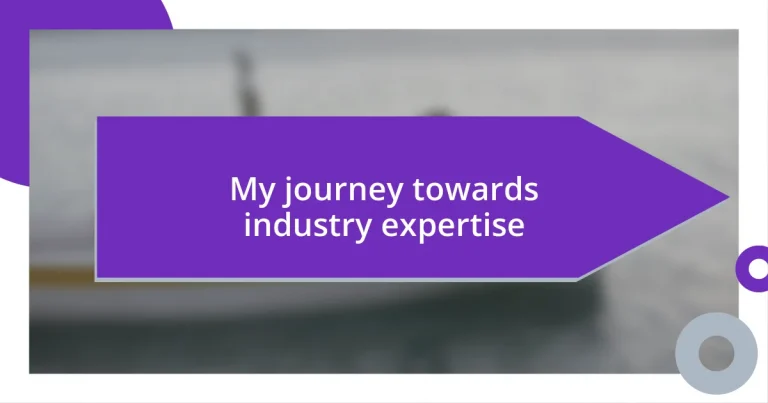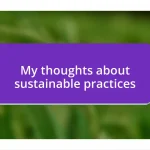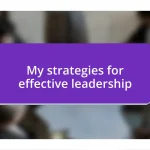Key takeaways:
- Improving communication and adaptability was essential for professional growth, enabling clearer idea sharing and resilience in fast-paced environments.
- Internships provided invaluable practical experience, fostering accountability, confidence, and enhancing the application of theoretical knowledge.
- Continuing education and networking build credibility and connections, opening new opportunities and personal growth avenues in one’s career.
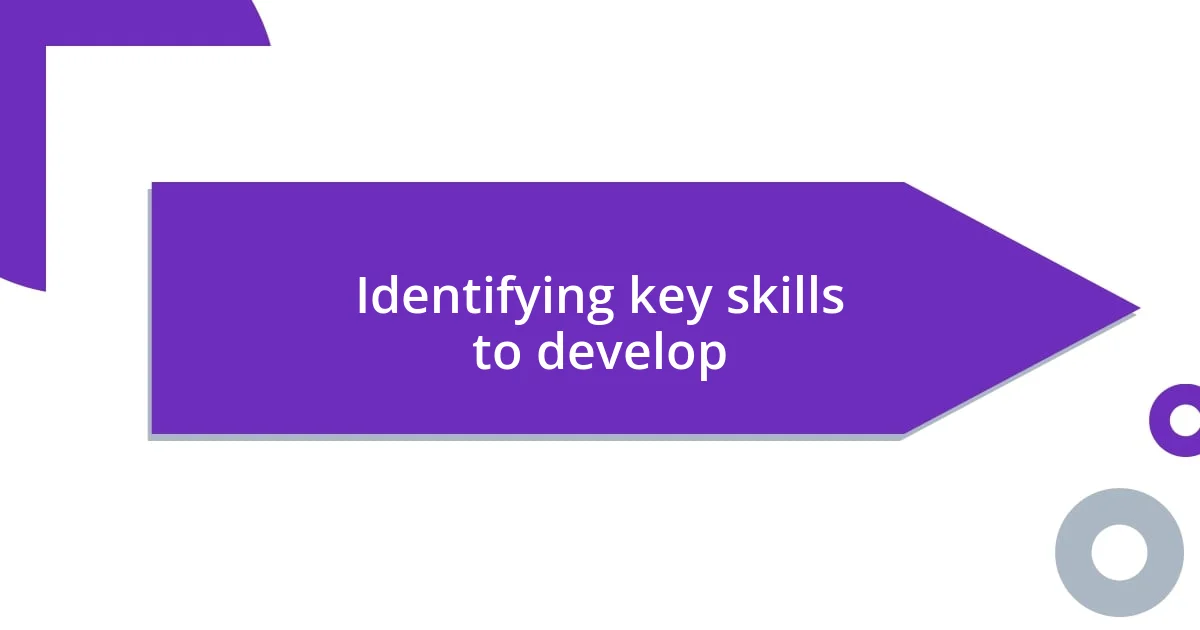
Identifying key skills to develop
Reflecting on my journey, I quickly realized that communication was among the foremost skills I needed to hone. I vividly recall a presentation early in my career that left me feeling vulnerable, as I struggled to convey my ideas clearly. Have you ever experienced that gut-wrenching moment of not being understood? Investing time in improving this skill transformed my interactions, from board meetings to casual conversations.
Another crucial skill that stood out to me was adaptability. Working in a fast-paced environment, I often faced unexpected challenges. I remember a project that veered off course, testing my ability to pivot and respond. It made me wonder, how do we stay resilient in the face of change? By embracing flexibility, I learned to view obstacles as opportunities for growth, which has become a powerful mindset in my profession.
Lastly, the importance of industry knowledge cannot be overstated. When I started, I felt overwhelmed by the complexities of my field. Yet, through dedicated research and mentorship, I became more confident in my expertise. How do we become truly knowledgeable? It’s about immersing ourselves in our industries and continuously seeking learning opportunities, both of which have profoundly impacted my career trajectory.
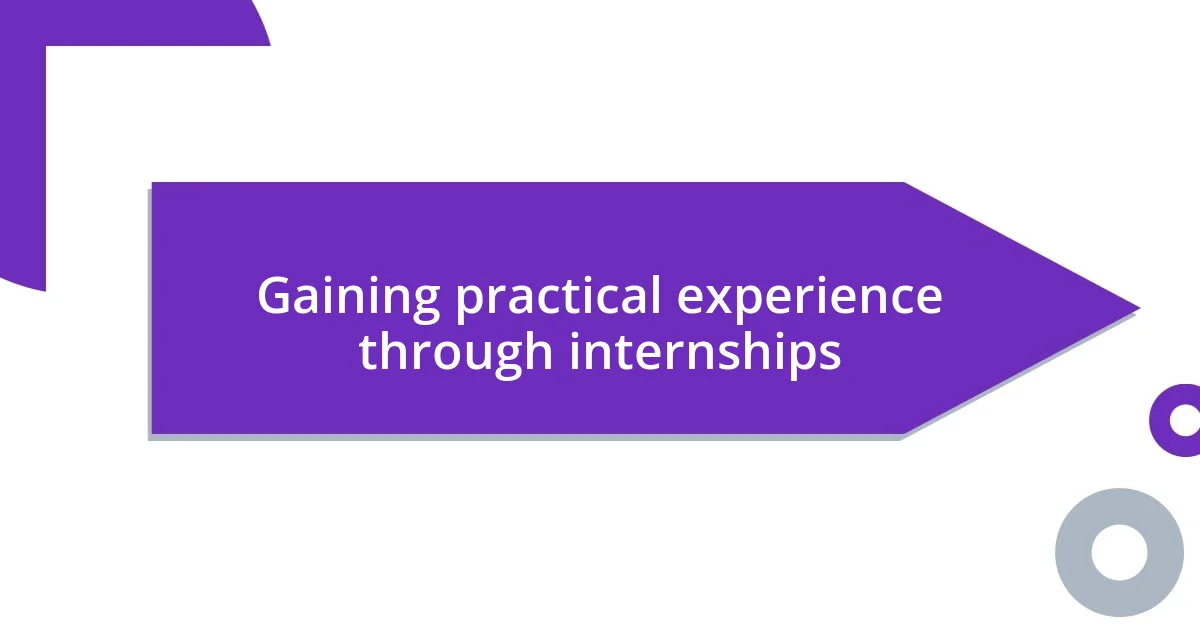
Gaining practical experience through internships
Gaining practical experience through internships played a pivotal role in my journey. I remember landing my first internship in a bustling marketing department. The adrenaline rush of being entrusted with real projects instead of merely observing was exhilarating. It reinforced my belief that on-the-job experience is irreplaceable; there’s simply no classroom that can replicate the complexities and energy of a real work environment.
One memorable experience involved collaborating on a social media campaign. Initially, I was apprehensive about sharing my ideas, fearing they might be naive. But my supervisor encouraged me to contribute, reminding me that fresh perspectives often spark innovation. That moment taught me the value of teamwork and confidence in my voice. Have you had a similar experience where being proactive changed the outcome? I’ve come to understand that internships are more than just resume builders; they’re platforms for self-discovery and professional development.
Internships also allowed me to observe and learn from seasoned professionals. I experienced several “a-ha” moments, where concepts I previously studied clicked into place when I saw them applied in real life. It’s astounding how practical experience enhances theoretical knowledge. The questions I grappled with in school suddenly felt tangible, making learning not just academic but profoundly relevant to my day-to-day tasks.
| Aspect | Internship Experience |
|---|---|
| Trust in Responsibilities | Engaging in real projects drives accountability and ownership. |
| Team Collaboration | Working with diverse teams fosters innovation and teamwork. |
| Real-World Application | Confronting practical challenges enhances theoretical understanding. |
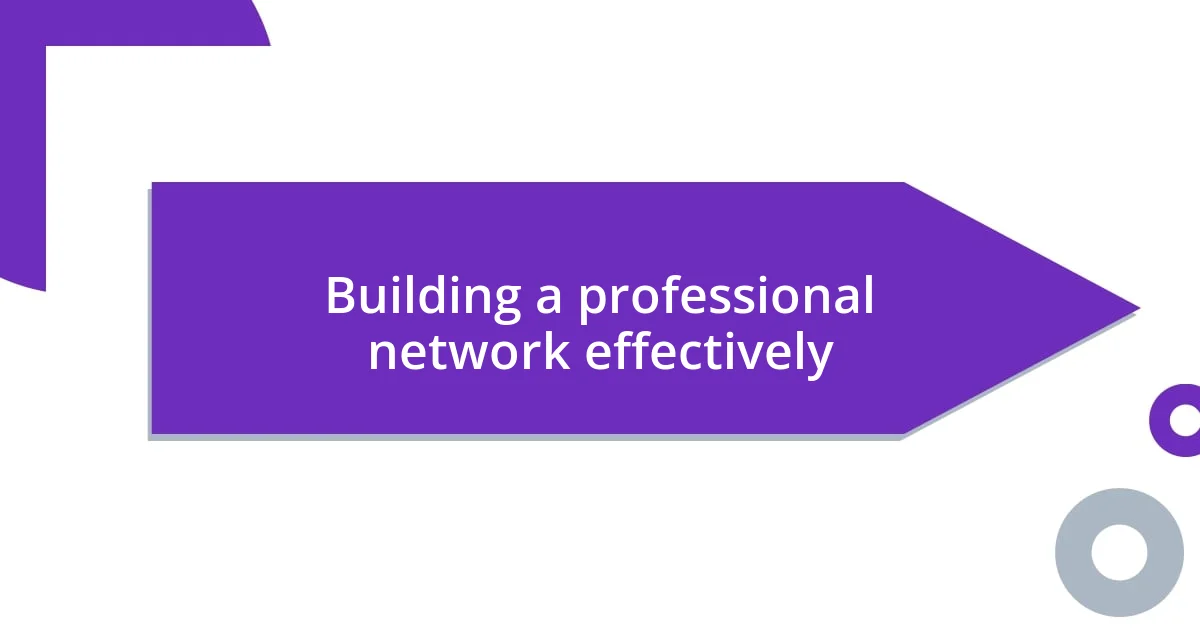
Building a professional network effectively
Building a professional network effectively is akin to nurturing a garden. In my early career, I realized that merely attending events wasn’t enough; it was about forming genuine connections. I can still recall a networking event where I struck up a conversation with a stranger who turned out to be a mentor figure throughout my career. The lesson? Approach networking with authenticity, and don’t hesitate to reach out with a simple follow-up email to continue the conversation.
Here are some key strategies to consider for effective networking:
- Be Proactive: Attend industry events, webinars, and workshops. Engage with speakers and panelists. Introduce yourself and ask thoughtful questions.
- Leverage Social Media: Utilize platforms like LinkedIn. It’s a tool where I’ve found meaningful connections by sharing insights and participating in relevant discussions.
- Offer Value: Look for opportunities to help others within your network. Whether it’s sharing an article or connecting two people, small gestures can go a long way.
- Stay Consistent: Regularly check in with your contacts. A quick message on their achievements or sharing resources keeps your network alive and supportive.
- Follow Up: After meeting someone, send a quick message to express your appreciation for the conversation. This reinforces your connection and opens the door for future communication.
Every time I interacted with someone new, I felt that rush of nervous excitement. It reminded me that building a network is not just about numbers; it’s about quality connections that can enrich your personal and professional life.
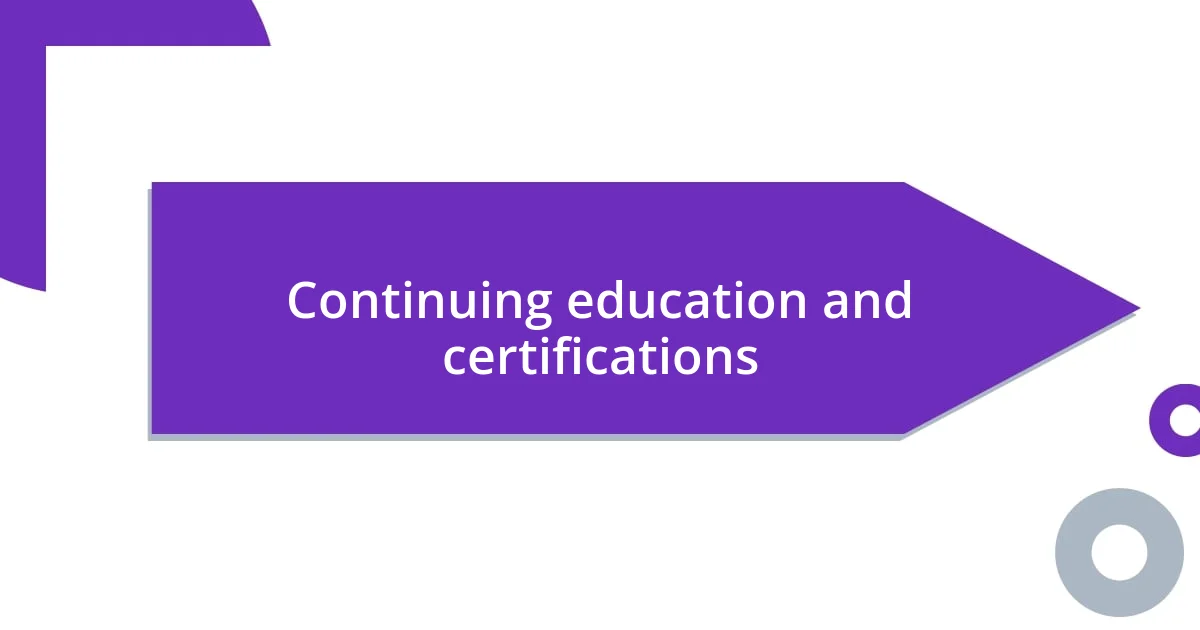
Continuing education and certifications
Continuing education and certifications have been cornerstones in my journey toward industry expertise. When I first considered additional qualifications, I felt a mix of excitement and anxiety. The idea of returning to the classroom, albeit online, felt daunting after several years in the workforce. However, diving into advanced courses was one of the best decisions I made. Each module pushed my boundaries and opened my eyes to new perspectives and practices that I had never encountered before. Have you ever felt that a course changed the way you approach your work? I certainly did.
Certifications can enhance credibility and expand your skillset dramatically. For instance, while studying for my digital marketing certification, I not only acquired new strategies but also gained a vibrant network of fellow learners — some of whom I still collaborate with today. Imagine building lasting relationships with peers while mastering intricate tools that set you apart in a competitive job market. That experience taught me that education isn’t just about the content; it’s about the connections you forge along the way.
I recall the exhilarating moment when I earned my first certification. The pride of displaying that badge on my LinkedIn profile felt like a rite of passage. It signified not just knowledge gained, but a commitment to growth and lifelong learning. Reflecting on this, I often wonder: how many opportunities am I now opened to simply because I took that leap? Continuing education and obtaining relevant certifications have created pathways for professional development I never imagined possible.
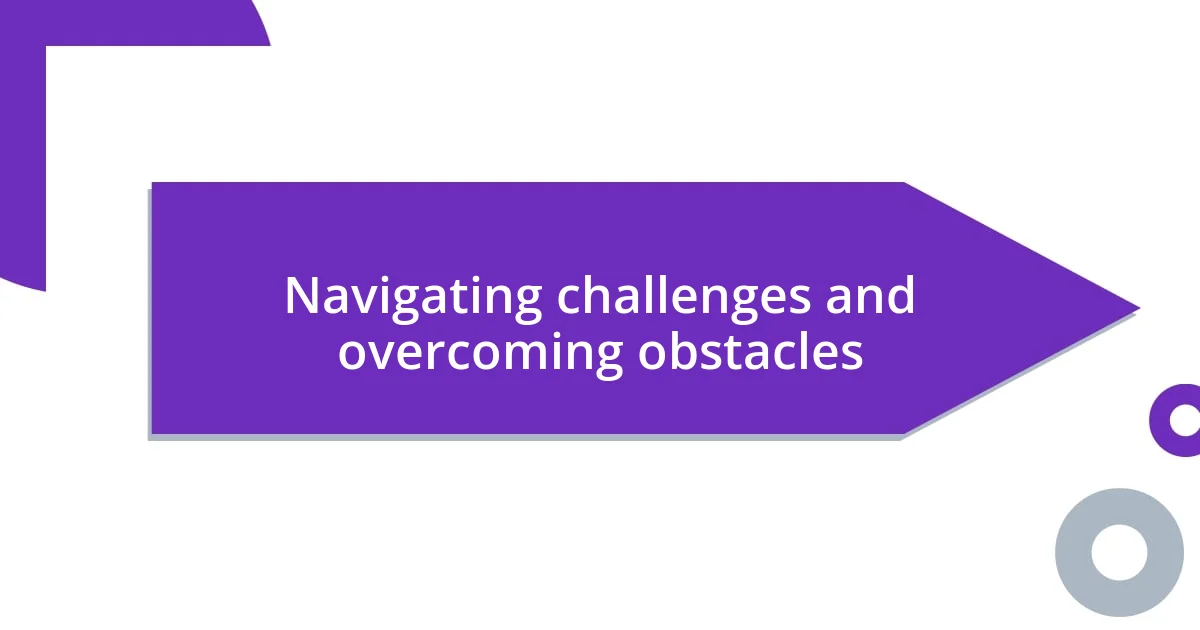
Navigating challenges and overcoming obstacles
Facing challenges in my journey has often felt like climbing a steep hill. I remember a moment early on when I missed out on a major project due to my lack of experience. That setback stung, and I questioned whether I was cut out for the industry. It was during this time of self-reflection that I realized obstacles are not dead ends; they are learning moments. Have you ever had an experience where a challenge turned into a catalyst for growth? For me, it was essential to embrace discomfort and use it as motivation.
As I navigated through difficulties, I learned the value of resilience. Each challenge prompted me to think critically and develop creative solutions. For example, when faced with a tight deadline and limited resources, I found myself collaborating with colleagues in ways I hadn’t before. We brainstormed and leveraged each other’s strengths, which not only helped meet the deadline but also strengthened our team bond. Isn’t it fascinating how challenges can foster collaboration?
In retrospect, I see these experiences as essential building blocks of my expertise. The moments of doubt and struggle forced me to adapt and evolve continuously. Each obstacle taught me strategies that I now count among my greatest assets. So, what if those challenges we dread are actually our greatest teachers? The answer has become clear: embracing and overcoming them shaped me in ways I never anticipated.












